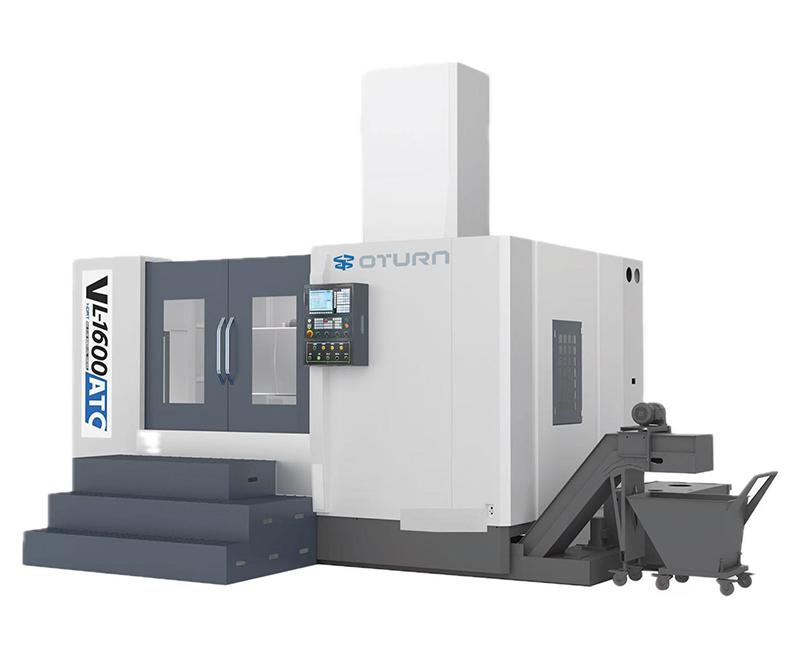With the increasing demand for high precision and efficiency in manufacturing, CNC milling-turning composite center have become widely used in the mold manufacturing industry. These CNC machines integrate multiple machining functions such as milling, turning, drilling, and tapping, enabling complex mold parts to be processed through multiple operations in a single setup. This greatly improves production efficiency and machining accuracy, meeting the strict requirements of mold manufacturing for complex shapes and high quality.
I. Technical Advantages of CNC Milling-Turning Composite Center
CNC milling-turning composite centers achieve coordinated movements of the milling cutter rotation, workpiece rotation, and multi-directional feed through multi-axis simultaneous, allowing the machining of complex mold contours and details. Their main advantages include:
· Shortened process chain and improved production efficiency
Traditional mold machining often requires multiple machines and setups, increasing production cycles and error risks. CNC composite centers complete multiple machining processes in one setup, significantly reducing changeover time and auxiliary steps, shortening mold manufacturing cycles, and improving overall efficiency.
· Enhanced machining accuracy and consistency
Reducing the number of setups avoids cumulative positioning errors, ensuring dimensional accuracy and surface quality of mold parts. Advanced online inspection and CNC systems can monitor machining status in real time to maintain stable high-precision machining.
· Multi-function integration to meet complex mold machining needs
Besides milling and turning, CNC composite center can perform drilling, tapping, and other operations, satisfying the machining requirements of various complex mold structures. Their multi-axis simultaneous capability makes machining complex surfaces, inclined planes, and special hole systems more efficient and precise.
· Space-saving and cost-reduction
Compared to traditional multi-machine setups, CNC turning and milling composite centers are compact and occupy less floor space, optimizing workshop layout. They also reduce the number of machines and fixtures needed, lowering capital investment and operating costs.
II. Specific Applications in Mold Manufacturing
· Complex mold contour machining
Mold parts often contain complex surfaces and fine details. CNC composite centers use multi-axis simultaneous to achieve high-precision surface milling and contour machining, meeting the high standards for surface finish and dimensional accuracy in plastic and stamping molds.
· Mold cavity and core machining
Mold cavities and cores have complex structures that are difficult to machine accurately and efficiently with traditional methods. CNC composite centers can complete roughing, semi-finishing, and finishing of cavities in one setup, significantly improving machining efficiency and mold quality.
· Multi-process composite machining
Mold manufacturing involves turning, milling, drilling, tapping, and other processes. CNC composite centers integrate these functions, reducing process switching and setup time, and enabling efficient continuous machining, especially suitable for batch mold production.
· Hard material machining
Molds often use hard materials like carbide and tool steel. CNC composite centers feature high rigidity and strong power to effectively CNC machine these hard materials, ensuring tool life and machining quality.
III. Intelligent and Automated Enhancements in Mold Manufacturing
Modern CNC milling-turning composite centers are equipped with automatic tool changers and intelligent monitoring systems, further improving automation and intelligence in mold machining. Automatic tool changers reduce manual intervention and downtime, while intelligent monitoring systems track key parameters such as vibration and temperature in real-time, ensuring machining safety and precision, and meeting the demands for efficient and stable mold production.
IV. Conclusion
Thanks to their multi-function integration, high-precision machining, and efficient production capabilities, CNC milling-turning composite centers have become core equipment for improving machining levels and production efficiency in mold manufacturing. By shortening process chains, reducing setup errors, enabling complex structure machining, and supporting intelligent management, these centers effectively meet the dual requirements of quality and efficiency in modern mold manufacturing. Choosing advanced CNC milling-turning composite centers will significantly enhance mold production capacity and strengthen market competitiveness.
OTURN specializes in providing high-rigidity, multi-functional CNC milling-turning composite centers tailored for mold manufacturing, helping customers achieve efficient and precise mold machining solutions.
Post time: Jun-17-2025








